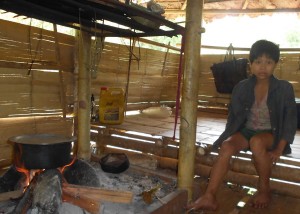In a small bamboo hut located at the bottom of a mountain in the Dawna Ranges, that rises in Eastern Burma, a small girl is busy putting firewood in a stove made out of three stones. The girl is, Naw Bleh Hsi, fills the water in a smoke blackened pot and sits it on top of the three-stone-stove to boil. Naw Bleh Hsi, 9, is boiling drinking water for her father who is working on a slash and burn rice field.
 Naw Bleh Hsi is one of an estimated 500,000 internally displaced people living in Eastern Burma. Naw Bleh Hsi and her family had been forced from their home in Gu Pha Doh Kee, Myawaddy Township, Karen State by the Burma Army in 2007. Since the Burma Army and its allies at the time, the Democratic Karen Buddhist Army destroyed Naw Bleh Hsi’s home the family has moved and lived in three different places.
Naw Bleh Hsi is one of an estimated 500,000 internally displaced people living in Eastern Burma. Naw Bleh Hsi and her family had been forced from their home in Gu Pha Doh Kee, Myawaddy Township, Karen State by the Burma Army in 2007. Since the Burma Army and its allies at the time, the Democratic Karen Buddhist Army destroyed Naw Bleh Hsi’s home the family has moved and lived in three different places.
One of six siblings, Naw Bleh Hsi is the second youngest. Since her mother’s death and despite her age, Naw Bleh Hsi is now the family’s main housekeeper – doing all the housework and caring for her younger sister. Naw Bleh Hsi’s older sister recently married and now lives with her in-laws and her older brothers have to work on the farm with their father leaving her in-charge at the family’s hut.
Naw Bleh Hsi’s father, Saw Kya Teet, 56, said that he had to be both a father and a mother for his five children since her wife died three years ago. Saw Kya Teet says that Naw Bleh Hsi was only six when she had to take care of her three-years-old sister.
Saw Kya Teet said if there had been access to healthcare and medicine his wife need not have died.
“We were constantly on the run from place to place finding hideouts in the jungle. We didn’t have enough food and we had no medicine. My wife got malaria and she couldn’t get enough medicine or treatment, so she died in the jungle.”
Naw Bleh Hsi says she would love to study but says she does not have much hope to do so as she has too many responsibilities at home.
“I would like to study very much but I can’t. My mom is not with us and my dad has to work on the farm to grow food for us. I have to stay home to take care of my younger sister and cook for my dad.”
Naw Bleh Hsi accepts the fact that she will not have a chance to study because her father cannot afford to send her to school.
“I want to go to school like other children but my dad doesn’t have the money to send me.”
Saw Kya Teet said that it was hard for him to make living for his family while there is armed conflict and it is not easy to be able to enroll his children into a school.
“The situation isn’t stable and we are always on the move. We don’t have a stable place to live in or farmland that we can consistently live and work on. Since I can’t make enough income, I can’t afford to send my daughters to school.”
Naw Bleh Hsi says she wants to study and to be educated in order to work and look after her father in the future.
“I want to go to school and study. I want to help my dad and take care of him when he gets old.”


